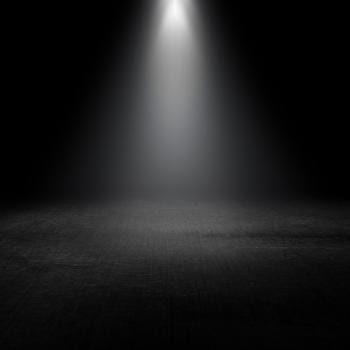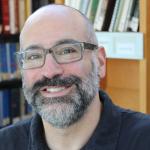By Gregory
The title of my post relates to the three scholars I will be quoting from, Orthodox Christian theologian, David Bentley Hart, Rabbi and Jewish scholar, Arthur Green, and Witch and Pagan scholar, Starhawk. Each of these thinkers speaks of Divinity in ways that coincide with my own experience of the Divine.
A couple of weeks ago, my husband and I went out to lunch with a close friend. Sitting out on the restaurant patio, I was captivated by the magnificence of the trees, whose leaves were changing color and were a vibrant golden orange. At that moment, and in those trees, I experienced God’s presence in a real, meaningful way.
“What is God?” is perhaps the better question than, “is there a God?”
I think a decent philosophical argument can be made for God in terms of God being the ground of existence, the uncaused cause, the first principle of creation, the underlying non-contingent being. You get the idea.
In one sense, the proper way to speak of God is in terms of the absolute and the contingent, the necessary and the fortuitous, potency and act, possibility and impossibility, being and non-being, transcendence and immanence.
That’s not to say that the language of prayer, miracles, love, and compassion is out of place. Rather, it’s to acknowledge that the first set of concepts is primary when attempting to talk about what is God.
Such descriptions of God are a far way off from the popular culture’s vision of an old man bathed in light watching down on us from beyond the stars.
When I assert a God of philosophy rather than Santa-God, I am often asked if I believe God is a person. My answer is that I don’t really know. Rabbi and scholar, Arthur Green offers this related insight:
In biblical language, the “I Am” of Sinai is already there behind the first “Let there be …” of Genesis. Creation is revelation, as the Kabbalists understood so well. To say it in more neutral terms, we religious types personify Being because we see ourselves as living in relationship to the underlying One. I seek to respond to the “I Am” that I have been privileged to hear, to place myself at its service in carrying forth this great mission of the evolving life process. To do so, I chose to personify, to call Being by this ancient name Yahweh/God. (Green – Radical Judaism)
I’m comfortable saying that God is relational and that any descriptions of God as person are metaphorical. We relate to the Divine – whatever he/she/it is.
It’s the last word in the above sentence – “is”, that can begin generating fruitful visions of the Divine.
I strongly recommend Orthodox Christian theologian, David Bentley Hart’s recent work, The Experience of God: Being, Consciousness, and Bliss as an antidote to much of today’s bad philosophy of God. Looking for something solid to root your theology in? Then read this book.
Hart does, in an updated and amazingly clear way, what other thinkers have done before – examine the notion of God from the perspective of being – thinking about God as we think about the word, “is”.
Approaching God this way isn’t as far afield from more traditional attempts than might first be assumed. In Genesis, at the burning bush, Moses asks God for God’s name – a question meant to get at the essence of God as well as a way to control God through invocation. What is God’s response? “I Am.” Or in Hebrew, Ayer Asher Ayer – translated along the lines of “I am, I am what it is, I will be what I will be” and other related phrases.
One interpretation of the quixotic answer is God telling Moses, “never mind my name, I’m not telling you.” Another interpretation is that God is trying to convey that he is being itself or at least the necessary existence that allows for being to be. Confused yet?
Hart offers this commentary on our confusion:
God is not something posed over and against the universe, in addition to it, nor is he the universe itself. He is not a “being,” at least in the way that a tree, a shoemaker, or a god is a being: he is not one more object in the inventory of things that are, or any sort of discrete object at all. Rather, all things that exist receive their being continually from him, who is the infinite wellspring of all that is. (Hart – The Experience of God: Being, Consciousness, and Bliss)
For those who find meaning in a God-concept, metaphors and symbols that help fuel the religious imagination prove valuable, allowing us foundations on which to build relational constructs from which to conduct our spiritual practice. No metaphor will adequately capture the essence of the Divine. Yet each vision offered contains seeds of promise that can spark imagination, moral impulses, and move the heart and mind.
We will always struggle with visions of the Divine that are intimate and remote, personal and impersonal, but in a sense living and dynamic. In more personalist language, transcendent experiences address us as persons, asking us to freely dispose of ourselves in accord with the values revealed and understood. We remain free to ignore, refuse, or agree with the claims and requests we sense.
Still, many find a Sacred Presence within natural activity – the unity and teleos of the processes or powers within the natural order. In this sense, God is the power that leads to the fulfillment of nature, including human nature, and not in the suspension of the natural order. Again, I quote Rabbi Green:
Teshuvah is the universal process of return. All things run toward their center, as fully and as naturally as plants grow in the light, as roots reach toward their source of water. The same universal will that is manifest in the evolution of life, ever striving toward higher forms of consciousness, is present in the desire of all things to turn inward and show that they are tied to a single source. The world that flows from the One seeks to return to the One. Yahweh is manifest throughout being, we recall, only to attest anew in each moment to the oneness of all that is. (Green – Seek His Face)
Other metaphors also provide insight – God is the sum of the animating, organizing forces and relationships which are forever making a cosmos out of chaos. This is what we understand by God as the creative life of the universe. Divinity is that coordinating, integrating factor in nature that makes possible the actualization of justice, truth, and compassion on earth.
One begins to recall the God of Tillich or Kaplan – our ultimate concern, the creative principle in nature, or the Power that causes salvation. Such approaches posit the Divine as the ordering principle within the natural order – implying God as the creative power within nature and the universe – the one who brings order out of chaos, the life-affirming power that drives evolution.
Further ideas – God is the vitalism that interpenetrates nature and empowers the interconnected web of life – the energy flowing throughout nature and immanent in the earth’s cycles of birth, growth, death, decay and regeneration.
Allow me to add to this mix and often neglected theologian in such discussions, Starhawk. Yes, I’m aware that she’s a Witch, or Pagan. But why should that eliminate her from the conversation?
Starhawk relates to Divinity, as does much of her tradition, in terms of the feminine, therefore, she speaks of the Goddess:
For me, the Goddess is the name we put on the great processes of birth, growth, death, and regeneration that underlie the living world. The Goddess is the presence of consciousness in all living beings; the Goddess is the great creative force that spun the universe out of coiled strings of probability and set the stars spinning and dancing in spirals that our entwining DNA echoes as it coils, uncoils, and evolves. (Starhawk – The Earth Path)
God is the breath of life – the vitalism that interpenetrates nature and empowers the interconnected web of life – the energy flowing throughout nature and immanent in the earth’s cycles of birth, growth, death, decay and regeneration. The Divine impulse/energy (grace) operates freely in an open universe, empowering, but not controlling events and circumstances. The Divine energy is creative and constant, not capricious – mixing with nature’s inherent ways, the human heart, and random happenstance.
In other words, God is what I experienced in that tree outside the restaurant.











